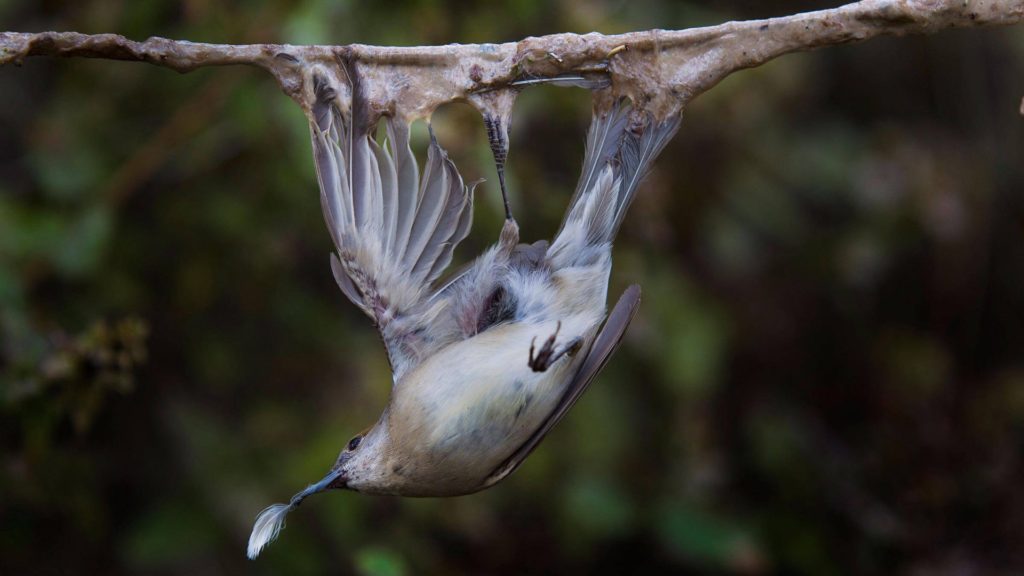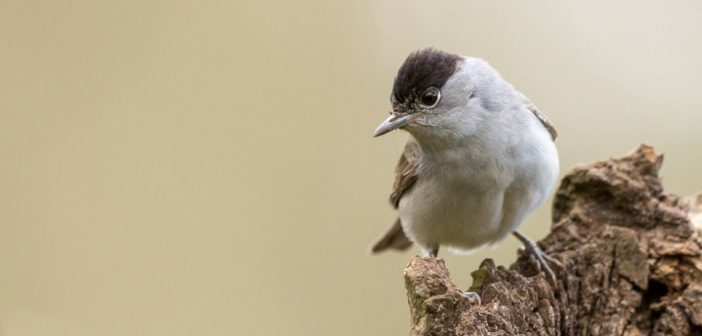Written by By Jessica Law
The Eurasian Blackcap is one of seven flagship birds in our Flight for Survival campaign to raise awareness of the scope and scale of the illegal killing of migratory birds.
For many people, it’s an iconic sound of the countryside: a rich, complex musical whistle which culminates in a loud, high-pitched crescendo. It is so strident that you might not be able to work out where it’s coming from: the tiny Eurasian blackcap (Sylvia atricapilla), a handsome woodland-dwelling warbler. Nicknamed the “mock nightingale,” their mellifluous music has inspired artists through the ages. In fact, 20th century composer Messiaen’s opera Saint François d’Assise draws directly from the Eurasian blackcap’s song.
In a more tragic tale, 19th century author Giovanni Verga based his novel on the story of a blackcap trapped and caged by children. Deprived of its freedom, the bird stops singing and eventually dies. Sadly, this tale is reflected in reality: like many great singers, the Eurasian blackcap’s life is beset with great adversity. As they migrate through the Mediterranean en route to their European breeding grounds, hundreds of thousands of birds end up tangled in vast, near-invisible “mist-nets,” or unable to take off from perches that have been secretly coated with glue. Those birds that don’t perish from the initial shock can struggle in pain for hours.

This blackcap is stuck in an illegal glue trap. The organized trapping racket can make €15 million per year. Image © BirdLife Europe
The reason behind this shocking activity can be summarized in one word: ambelopoulia, a traditional dish made of Eurasian blackcaps and other songbirds, boiled or grilled and eaten whole. For centuries, songbirds have been trapped for food across the Mediterranean, but in Cyprus, the large-scale industry it has become is a far cry from past traditions. Although banned since 1974, the demand for this delicacy is driving a lucrative black market. Restaurants that serve the dish can fetch up to €80 (around 90 US dollars) per plate. Run by career trappers, some involved in organized crime, this racket can make €15 million (over 17 million US dollars) per year.
In an ironic twist, poachers use the Eurasian blackcap’s own beautiful song against them, playing it on illegal electronic calling devices to lure them towards the traps. The result is devastating, and the decimation is part of a far bigger problem: although aimed at the Eurasian blackcap, the traps are indiscriminate, and have been found to catch at least 155 bird species, including those with decreasing populations, such as the red-backed shrike (Lanius collurio) and Eurasian scops owl (Otus scops). And it’s not just species that are passing through: even Cyprus’s own breeding endemics, the Cyprus wheatear (Oenanthe cypriaca) and Cyprus warbler (Sylvia melanothorax), find themselves lethally entangled. Unwanted birds are simply killed and discarded. According to a study by BirdLife Cyprus, 2.3 million birds were illegally killed in Cyprus during autumn 2016 alone.
Nowhere has this been worse than Cyprus’ British Sovereign Base Area, spanning the Dhekelia and Famagusta districts. 2016’s record level of illegal killing at this “blackspot” sparked an urgent response from the United Kingdom government. But action isn’t just coming from the outside, as BirdLife Cyprus is working tirelessly to end this practice on their home soil. Knowledge is power, and their long-running surveillance program has made them a national expert on the illegal killing crisis and its impact on migratory bird populations. Now, conservationists know where to focus their efforts and how to report and prevent this illegal activity.
Illegal bird killing is a complex issue, especially when it is so ingrained in the culture of local people. BirdLife Cyprus knows that to end this crisis, it’s not enough to simply enforce laws. They also need to change minds. One of the best ways to do this is to inspire a love and respect for nature at a very young age. Their large-scale education program extends to schools, where children can take on the persona of Ulysses the Eurasian blackcap in a specially-designed board game, experiencing the challenges he faces on his epic migratory journey home. Last year, BirdLife Cyprus also released a highly popular birdwatching book for children, as the start of what will hopefully become a new movement for nature in the country.
Ulysses the Eurasian Blackcap teaches children about the perils faced by migratory birds.
BirdLife Cyprus’ awareness-raising also extends to adult audiences. They speak out across a wide range of public media in order to dispel the myth shared by many citizens that bird trapping is still the harmless, small-scale tradition it once was. And the movement has already begun making a huge difference. Since 2016, mist netting has decreased by a staggering 72% at Dhekelia Sovereign Base Area, and in Cyprus overall, the estimated number of birds trapped is now less than a third of what it was. Many members of the public now support BirdLife Cyprus’s initiatives, reporting that they were simply unaware that illegal bird killing was a serious issue. There is still much work to be done, but we are confident that, like the tiny bird with a powerful voice, we will get our message heard.
Featured image: a Eurasian blackcap. Eurasian Blackcaps are illegally lured towards traps using recordings of their song. Image © BirdLife Europe.





